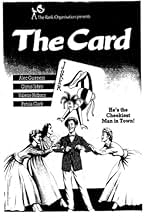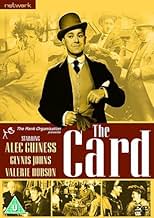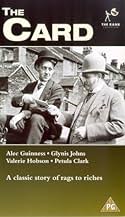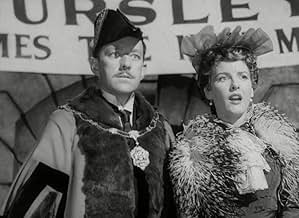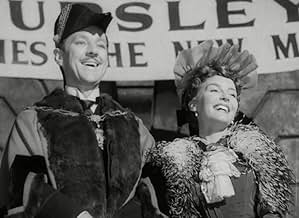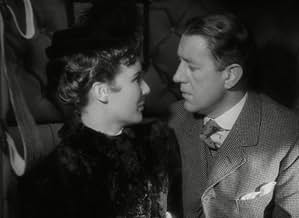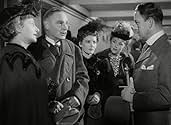Ajouter une intrigue dans votre langueEdward Machin, an Edwardian-era young rogue of lowly origin, decides he must do what he can to raise his living standards in order to see the world and shape his own destiny.Edward Machin, an Edwardian-era young rogue of lowly origin, decides he must do what he can to raise his living standards in order to see the world and shape his own destiny.Edward Machin, an Edwardian-era young rogue of lowly origin, decides he must do what he can to raise his living standards in order to see the world and shape his own destiny.
- Réalisation
- Scénario
- Casting principal
- Nommé pour 1 Oscar
- 1 nomination au total
John Adams
- Customs Official
- (non crédité)
Peter Copley
- P. Shillitoe
- (non crédité)
Mark Daly
- Lord Mayor
- (non crédité)
Arthur Dibbs
- Doorman
- (non crédité)
Deidre Doyle
- Widow Hullins
- (non crédité)
Henry Edwards
- Mr. Cotterill
- (non crédité)
Avis à la une
10gray4
One of the greatest British comedies of the 1950s and one of Alec Guinness' most satisfying roles early in his long career. As Denry Machin, son of a washerwoman and the "card" of the title, Guiness brings to life one of the almost forgotten stories about the "five towns" (Stoke-on-Trent) of Arnold Bennett. The old-fashioned and very English word "card" had to be translated into the American title "the promoter", but that is a far less accurate description of Denry Machin's combination of charm and opportunism.
He is supported by four magical actresses, in sharply contrasted roles. Gold-digger Glynis Johns, her friend Petula Clark, aristocrat Valerie Hobson and mother Valerie Turleigh are all charmed in their different ways by Guiness' smiles as he "gives providence a helping hand". William Alwyn's music is perfect, with a jaunty theme-tune that has lingered in my memory for more years than I care to remember. Ronald Neame's direction, also at the start of an impressive directorial career, brings the best out of Guinness, although the setting is disappointingly 'comedy-Northern' rather than specifically Stoke-on-Trent.
Overall a delightful film, and the perfect pick-me-up after watching a depressing Hollywood block-buster (Million Dollar Baby). And watch out for one of the movies' great sign-off lines, from Valerie Hobson.
He is supported by four magical actresses, in sharply contrasted roles. Gold-digger Glynis Johns, her friend Petula Clark, aristocrat Valerie Hobson and mother Valerie Turleigh are all charmed in their different ways by Guiness' smiles as he "gives providence a helping hand". William Alwyn's music is perfect, with a jaunty theme-tune that has lingered in my memory for more years than I care to remember. Ronald Neame's direction, also at the start of an impressive directorial career, brings the best out of Guinness, although the setting is disappointingly 'comedy-Northern' rather than specifically Stoke-on-Trent.
Overall a delightful film, and the perfect pick-me-up after watching a depressing Hollywood block-buster (Million Dollar Baby). And watch out for one of the movies' great sign-off lines, from Valerie Hobson.
(Hallmark Home Entertainment VHS 91 mins) I first saw this movie almost exactly fifty years ago. At that time it was known as The Promoter. This film shows without a doubt the enormous talents of Alec Guinness. I seem to feel that it did not receive the acclaim of some other Guinness films possibly due the date of its release, 1952. Just after Lavender Hill Mob and before A Captain's Paradise. There is absolutely nothing I didn't like about the picture. The three principal ladies were all superb. This was the only film Guinness made with Petula Clark or Glynis Johns. He did make Great Expectations and Kind Hearts and Coronets with Valerie Hobson. I have always remembered one scene with Guinness and Johns. In the movie they are engaged and Johns spends Guinness' money as fast as she could. At one store the shop keeper asks for the name and address, so as to be able to have the package delivered. Guinness, without hesitating one instant answers, "Rockefeller - Buckingham Palace." Wonderful film - great entertainment!
A classic Alec Guinness, as the young man from the lower class who wants to move up in the world, and does, because he has the courage to go for it. In one scene his boss tells him off (not an exact quote), "So, you fancy yourself being with your betters, do you?" The cheeky reply is "Yes, don't you?"
The best line is when his assistant brings him a pile of money collected from his latest enterprise, and comments that it seems a lot of money for doing nothing. The response is: "But I did do something; I thought of it."
This is a funny, thoughtful, social commentary, with a great look at both the lower and upper classes.
The best line is when his assistant brings him a pile of money collected from his latest enterprise, and comments that it seems a lot of money for doing nothing. The response is: "But I did do something; I thought of it."
This is a funny, thoughtful, social commentary, with a great look at both the lower and upper classes.
Alec Guinness' reputation as a serious actor tends to overshadow the subtle but deftly comic early work he was involved in, even when the films themselves (especially his handful of Ealing classics) are highly-regarded. This was another fine (and reasonably popular) vehicle for him in which he plays a go-getter(!) who uses his wits – and the helping hand lent him by Fate – to rise the ranks in British society from a washer-woman's son to, ultimately, Mayor of his town. In this respect, the film reminded me of two similar efforts i.e. NOTHING BUT THE BEST (1964) and THE RISE AND RISE OF MICHAEL RIMMER (1970) – which I owned but had not yet checked out (and which I then promptly opted to include in my ongoing Christmas schedule); of course, thematically, it is not unlike Ealing's own KIND HEARTS AND CORONETS (1949; in which Guinness had memorably played eight murder victims)...but the approach here is altogether more genteel and nostalgic (even if there are a few undeniable belly-laughs along the way), thus lacking the pointed satirical barbs which distinguished the earlier (and later) films. Anyway, the star delivers an entirely disarming performance and the film – augmented by its charming period setting – proves a most delightful concoction. He is abetted besides by three splendid leading ladies in Glynis Johns (surprisingly playing haughty), Valerie Hobson (obviously aristocratic, her feathers apparently not even unruffled by a pratfall!) and Petula Clark (not yet the chart-topping singer and, tackling the role of a commoner, is naturally Guinness' eventual choice of partner). Foremost among the supporting cast, then, is Edward Chapman – later a stooge in many a Norman Wisdom comedy – as Guinness' disgruntled former employer, but several other familiar faces crop up throughout (Peter Copley, Michael Hordern, Wilfrid Hyde-White, Frank Pettingell, etc). For the record, this was the first of four appearances by the star in films directed by Neame (apart from two the latter had produced for David Lean); of these, the only one I have yet to watch is another comedy, THE HORSE'S MOUTH (1958), which I might as well get to now rather than later...
It's easy to like this charming, unpretentious film in which Alec Guinness's restrained performance hits all the right notes. His fine work during the early 50's is unfortunately overshadowed by the public's identification with him in such big budget productions as The Bridge Over the River Kwai and Lawrence of Arabia. It's the "small movies" like this one (The Lady Killers, The Last Holiday, The Captain's Paradise and Man in the White Suit also come to mind) where we see his real skill and genius. The Card is enhanced by the appealing characters played by Glynis Johns and Valerie Hobson. Fans will also recall Hobson in another Guinness film, Kind Hearts and Coronets. One bit of puzzling trivia: How did Eric Ambler, known mostly for his espionage novels and, later, for Topkapi, come to write the screenplay for this gentle comedy?....
Le saviez-vous
- AnecdotesBursley, the town where this movie takes place, is a fictionalized version of Burslem, one of the constituent towns that make up Stoke-on-Trent, also known as the "Potteries" or, as in the movie, "the city of five towns".
- GaffesWhen Denry looks at the invitation to the dance he has received in the mail at home, is name is written completely different than when he filled it out himself at work previously.
- Citations
Mrs. Machin: You can live where ya like... but i'm stayin' here.
Meilleurs choix
Connectez-vous pour évaluer et suivre la liste de favoris afin de recevoir des recommandations personnalisées
- How long is The Promoter?Alimenté par Alexa
Détails
- Date de sortie
- Pays d’origine
- Langue
- Aussi connu sous le nom de
- The Promoter
- Lieux de tournage
- Llandudno, Conwy, Pays de Galles, Royaume-Uni(where Denry goes on vacation)
- Sociétés de production
- Voir plus de crédits d'entreprise sur IMDbPro
- Durée
- 1h 25min(85 min)
- Couleur
- Rapport de forme
- 1.37 : 1
Contribuer à cette page
Suggérer une modification ou ajouter du contenu manquant

